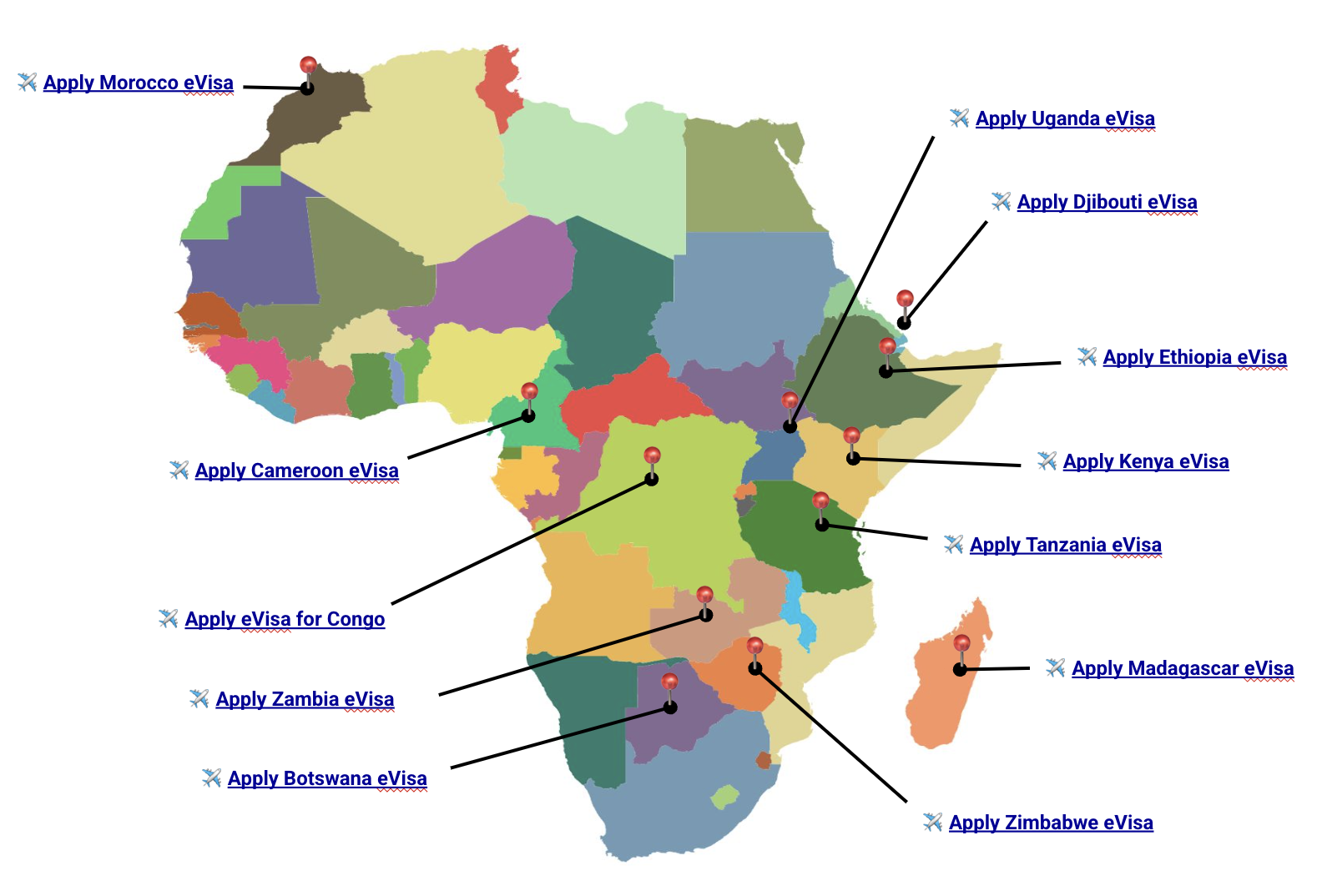Zimbabwe e-Visa Validity
Planning a trip to Zimbabwe? Whether you're heading there for tourism, business, or a quick stopover, it’s crucial to understand how the Zimbabwe eVisa works—especially when it comes to its validity. Many travellers make the mistake of assuming their eVisa will cover them throughout their entire stay, but each visa has specific rules. In this guide, we’ll take you through everything you need to know about Zimbabwe eVisa validity.
- Zimbabwe e-Visa Validity
- What is the Zimbabwe eVisa?
- Eligibility and Application Process
- How Long is the Zimbabwe eVisa Valid For?
- Can You Extend the Validity of Your Zimbabwe eVisa?
- What Happens if Your Zimbabwe eVisa Expires?
- Common Mistakes to Avoid Regarding eVisa Validity
- How to Renew Your Zimbabwe eVisa After Expiration
- Can You Travel to Zimbabwe Without an eVisa?
- Why is Understanding eVisa Validity Important?
- Explore Africa: Discover the Neighbours of Zimbabwe
- Zimbabwe eVisa Eligibility
- Conclusion
- Frequently Asked Questions
What is the Zimbabwe eVisa?

Before diving into validity, let’s first get a clear idea of what the Zimbabwe eVisa actually is. The Zimbabwe eVisa is an electronic travel authorisation that allows visitors from certain countries to enter Zimbabwe without the need for a traditional visa obtained at an embassy or consulate.
The eVisa system is simple, fast, and convenient. Travellers can apply online, get their approval via email, and simply present it upon arrival.
Eligibility and Application Process
You can apply for a Zimbabwe eVisa online if you are from an eligible country. The process is straightforward: fill out an application form, upload necessary documents, pay the visa fee, and wait for approval. Approval usually takes about ..., so don’t wait until the last minute!
How Long is the Zimbabwe eVisa Valid For?
When it comes to the validity of your Zimbabwe eVisa, it’s important to know that not all eVisas are the same. The duration of your eVisa depends on the type of visa you’ve applied for and how long you plan to stay in Zimbabwe.
Generally, the Zimbabwe eVisa is valid for 30 days from the date of issue. However, this may vary depending on your chosen visa type and entry. Let’s break it down a little further:
|
eVisa Type |
Duration of Stay |
Validity |
Entries |
|
Holiday eVisa |
Allows max stay of 30 Days |
Valid for 30 Days from the Date of issue |
Single |
|
Valid for 90 Days from the Date of issue |
Double |
||
|
Conference eVisa |
Allows max stay of 30 Days |
Valid for 30 Days from the Date of issue |
Single |
|
Valid for 90 Days from the Date of issue |
Double |
||
|
Business eVisa |
Allows max stay of 30 Days |
Valid for 30 Days from the Date of issue |
Single |
|
Valid for 90 Days from the Date of issue |
Double |
||
|
Transit visa |
Allows max stay of 7 Days |
Valid for 30 Days from the Date of issue |
Single |
Can You Extend the Validity of Your Zimbabwe eVisa?
Once your eVisa expires, you can’t just keep using it. You will need to leave the country or apply for an extension, but there’s a catch: extensions are not always guaranteed.
In most cases, you must apply for an extension before your visa expires. Zimbabwe’s immigration policy typically allows for a 30-day extension, but this is at the discretion of immigration officers. If you need to extend, it’s always a good idea to do so well in advance.
What Happens if Your Zimbabwe eVisa Expires?

If your Zimbabwe eVisa expires before you leave the country, there can be serious consequences. Overstaying your visa can result in fines or deportation. Additionally, you may be banned from entering Zimbabwe for a certain period of time.
To avoid this, always make sure you leave the country before your visa expires, or apply for an extension if needed.
Common Mistakes to Avoid Regarding eVisa Validity
When applying for your Zimbabwe eVisa, here are some common mistakes to avoid:
- Incorrect details: Double-check your personal details, passport number, and travel dates before submitting your application.
- Confusing entry dates: Ensure your travel dates match your eVisa’s validity period.
- Overstaying: Keep track of your eVisa expiration date to avoid any fines or penalties.
How to Renew Your Zimbabwe eVisa After Expiration
If your eVisa expires and you’re still in Zimbabwe, you’ll have to leave the country and apply for a new visa. Unfortunately, you can’t renew your eVisa from within Zimbabwe.
The good news? Reapplying is simple. Just follow the same steps you used for your initial application.
Can You Travel to Zimbabwe Without an e-Visa?
Citizens from certain countries are visa-exempt and don’t need to apply for an e-Visa. However, this is quite rare. Most travellers will need to apply for an e-Visa before their trip to Zimbabwe, unless they’re from a visa-exempt country.
Here are the countries whose citizens must obtain an e-Visa to travel to Zimbabwe:
See More Countries
Why is Understanding eVisa Validity Important?
Understanding the validity of your eVisa is essential to avoid any unwanted surprises. By knowing how long your visa is valid for and what you need to do if it expires, you can make sure your trip to Zimbabwe goes smoothly and without incident.
Explore Africa: Discover the Neighbours of Zimbabwe

Applying for an e-Visa has never been easier. Looking to explore Africa? Check out the eVisas for the following countries:
Zimbabwe eVisa Eligibility
To be eligible for a Zimbabwe eVisa, you must meet the following criteria:
- You must be a national of an eligible country. (Check Eligibility)
- You must possess a passport with at least 6 months of validity.
- Your purpose for the trip must align with the features of the visa you hold (tourism or business etc).
- You must have no intention of seeking a long-term stay in the country.
- You must have proof of financial sufficiency.
Conclusion
Navigating the Zimbabwe eVisa system might seem tricky at first, but understanding the validity rules can save you from a lot of stress. Remember, always plan ahead, double-check your details, and keep an eye on the expiration date of your eVisa to ensure you don’t overstay.
Frequently Asked Questions
Not exactly. While the validity period might be 90 days, the crucial part is your duration of stay. Even with a 90-day validity, your actual visit can't exceed the maximum stay allowed (usually 30 days). Think of it like a window of opportunity: you have 90 days to use the visa, but once you enter, the clock starts ticking on your permitted stay, which is typically shorter. Do not make the mistake of assuming the longer validity means you can stay longer.
The 30-day (or other applicable) duration of stay begins the moment you set foot in Zimbabwe, not from the date your eVisa was issued. The issuance date simply marks the start of the window within which you can use your visa. So, if your eVisa is issued on January 1st, and you arrive in Zimbabwe on January 15th, your 30 days start counting from January 15th, not January 1st.
This is a tricky situation, and it's crucial to address it immediately. Do not attempt to travel with the incorrect visa. Contact the Zimbabwean immigration authorities or the embassy/consulate as soon as possible. Explain the error and inquire about the procedure for correcting it. Trying to use a visa with incorrect information could lead to serious problems at the border. It's better to deal with the hassle now than face potential denial of entry later.
Yes, your eVisa is valid for your stay within Zimbabwe, regardless of your method of entry or exit (unless it's a specific transit visa). Whether you fly in and drive out, or vice-versa, the eVisa covers you for the approved duration of stay. Just ensure your exit date falls within the validity period of your visa.
Content Disclaimer: While every effort has been made to ensure the accuracy of this information as of February 2025, it's crucial for travelers to double-check with the appropriate agencies, embassies, and airlines to guarantee the information is current and applicable to their travel plans.

To help us improve